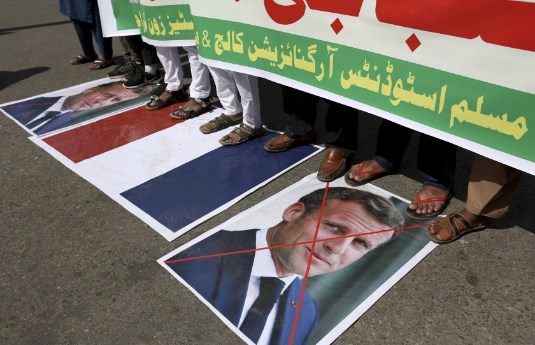
Friday October 30, 2020

Thousands of Muslims, from Pakistan to Lebanon and the Palestinian territories, poured out of prayer services to join protests Friday against French President Emmanuel Macron and his vow to protect the right to caricature the prophet Muhammad.
Demonstrations in Pakistan’s capital, Islamabad, turned violent as about 2,000 people who tried to march toward the French Embassy were pushed back by police firing tear gas and beating protesters with batons.
Crowds of Islamist activists hanged an effigy of Macron from a highway overpass after pounding it furiously with their shoes. Several demonstrators were wounded in clashes with police, and authorities deployed more security forces to protect the embassy.
In the eastern Pakistani city of Lahore, thousands of worshipers celebrating Mawlid, the birthday of Muhammad, took to the streets chanting anti-France slogans, raising banners and clogging major roads en route to a Sufi shrine. In Multan, a city in eastern Punjab province, thousands more burned an effigy of Macron and demanded that Pakistan sever ties with France and boycott French goods.
In Jerusalem, hundreds of Palestinians protested against Macron outside the Al-Aqsa Mosque, the third holiest site in Islam, chanting: “With our souls and with our blood we sacrifice for our prophet, Muhammad.” Some youths scuffled with Israeli police as they exited the esplanade into the Old City. Israeli police said they successfully dispersed the gathering and detained three people.
Advertisement
A few hundred demonstrators in Beirut flocked toward the Palais des Pins, the official residence of the French ambassador to Lebanon, but found their way blocked by lines of police officers in riot gear. Carrying black and white flags with Islamist insignia, the Sunni Islamist activists cried: “At your service, O prophet of God.” Some slung stones at police, who responded with tear gas.
Anti-France protests in Lebanon are an embarrassment for Prime Minister-designate Saad Hariri, who is trying to form a new government that would implement a French plan for reform in Lebanon. France, Lebanon’s former colonial ruler, has been helping chart a course for the country out of its severe economic and financial crisis.
A second suspect is in custody in the investigation into a gruesome attack by a Tunisian man who killed three people in a church in Nice, France.
A huge crowd of about 50,000 demonstrators also rallied in the Bangladeshi capital of Dhaka, burning effigies of Macron and holding signs that read, “Say no to Islamophobia,” “Stop racism” and “Boycott French products.” Authorities deployed hundreds of riot police and used barbed wire to cordon off the country’s main mosque.
And in Afghanistan, members of the Islamist party Hezb-i-Islami set the French flag ablaze. Its leader, Gulbuddin Hekmatyar, warned Macron that if he doesn’t “control the situation, we are going to a third world war and Europe will be responsible.”
The protests come amid rising tensions between France and Muslim-majority nations, which flared up earlier this month when a young Muslim extremist beheaded a French schoolteacher who had shown caricatures of the Muhammad in class.
Those images, republished by the satirical magazine Charlie Hebdo to mark the opening of the trial for the deadly 2015 terrorist attack against the publication, have stirred the ire of Muslims across the world who consider depictions of the prophet blasphemous.
A series of attacks that French authorities have attributed to Muslim extremism ensued. On Thursday, a knife-wielding Tunisian man carrying a copy of the Quran killed three people at a church in the Mediterranean city of Nice.
That same day, a Saudi man stabbed and lightly wounded a security guard at the French consulate in Jidda, Saudi Arabia, prompting France to urge its citizens there to be on “high alert.”
Over the past week, protests and calls to boycott French products have spread rapidly from Bangladesh to Pakistan to Kuwait. Social media have been pulsing with anti-France hashtags. Muslim leaders, particularly Turkish President Recep Tayyip Erdogan, have loudly criticized France for what they see as the government’s provocative anti-Muslim stance.
Thursday’s attack in Nice also drew condemnations from leaders of countries that had voiced outrage over the caricatures, such as Saudi Arabia, Pakistan and Egypt.
In a Friday sermon aired live on Egyptian state TV, the country’s minister of religious endowments appeared to denounce any violent retaliation for the cartoons.
Advertisement
“Love of the prophet cannot be expressed by killing, sabotaging or responding to evil with evil,” said Mohamed Mokhtar Gomaa, addressing dozens of worshipers at a mosque in Daqahleya.